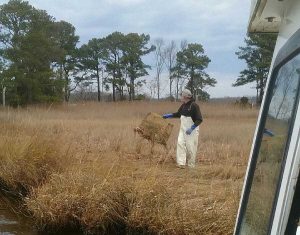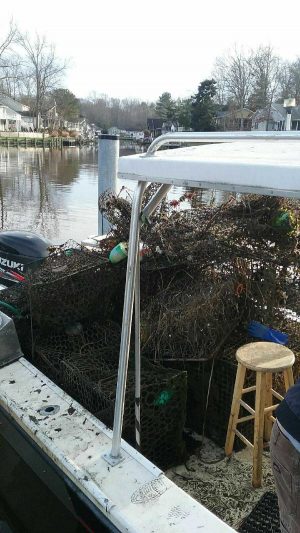
BERLIN – A team of local watermen and volunteers removed 27 abandoned crab pots from the coastal bays over the holiday season.
In one day, Maryland Coastal Bays Program (MCBP) volunteer Marie Brodey, commercial crabber Skip Maisel and his first mate removed 27 “ghost” crab pots from the waters near the Saint Martin River and Assawoman Bay.
Ghost crab pots are crab traps that are lost or left abandoned to sit on the bottom of the bays indefinitely. There, they continue to “ghost” fish, trapping crab, terrapin, and other animals and debris.
In 2017, for example, a dead river otter was recovered from an abandoned crab pot, and the year prior more than 20 dead terrapins were recovered from an abandoned crab pot in the Assawoman Bay.
Sandi Smith, development and marketing coordinator for MCBP, said
the 27 abandoned crab pots collected over the holiday season contained an assortment of debris – including a boogie board, large pieces of Styrofoam and plastic – that was transported for recycling. Volunteers also tallied the animals, or by-catch, found in the pots to keep track of the impact these pots have on bay marine life.
“Fortunately, there were no terrapin remains, which is typically what you find in these crab pots,” she said. “They did find live fish, which were released and dead crabs.”
Smith said all but three pots were buoyed and were put out by commercial crabbers. Most of the pots were pulled out of Greys Creek.
“Commercial crab pots are not required to have by-catch reduction devices, or turtle excluder devices …,” she said. “Unfortunately, the bait attracts other animals in the bays and they can’t get out of them.”
Smith said abandoned crab pots are a common problem in Maryland’s waterways. She noted that commercial crab pots are often lost because boat propellers cut the lines.
“Unfortunately, the derelict crab pots are a big issue,” she said. “So it’s a nice project to keep in tow.”
Recovery efforts are made possible through grant funding from the Environmental Protection Agency. The money allows MCBP to hire watermen who are familiar with the coastal bays and can retrieve marine debris from the bay bottom.
 “We try to do it every year after the crabbing season ends,” Smith said. “But last year we didn’t do it because the weather never cooperated.”
“We try to do it every year after the crabbing season ends,” Smith said. “But last year we didn’t do it because the weather never cooperated.”
Smith explained the number of crab pots retrieved in the offseason depends upon the size of the boat and the number of times watermen and volunteers can go out and collect.
“We have funding for up to 10 days, but weather is always a deterrent for this initiative,” she said. “[Maisel] is hoping to get out there again.”
For questions or more information on the project, contact Sandi Smith at [email protected] or call 410-213-2297 ext. 106.

